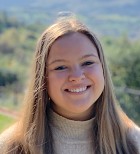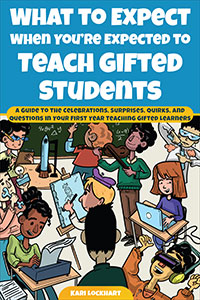Your First Year Teaching Gifted Learners
What to Expect When You’re Expected to Teach Gifted Students: A Guide to the Celebrations, Surprises, Quirks, and Questions in Your First Year Teaching Gifted Learners
By Kari Lockhart
(Prufrock Press, 2019 – Learn more)

I was inspired to read this book because when I was in elementary school, most of my friends went off to the gifted program and when they came back, they told me that they sat in a room and played games.
This was my only impression of what gifted programs were like. Now that I am working towards becoming a teacher, I might be asked to lead a gifted program, but I know little to nothing about this group of exceptional students except what my classmates told me in elementary school.

Identification of Gifted Learners
If you were expected to come up with a gifted program at your school, Lockhart gives strategies on how to identify gifted students and how to support these students when they are not in your classroom (i.e. with the general education teacher). In chapter 3 she gives examples of quantitative and qualitative data that can be used to help identify these students – including quantitative data like results from achievement tests and ability tests, and qualitative data like classroom observations, portfolios, and student interviews.
After discussing how to identify students, Lockhart explains how to co-teach with general education teachers, special education teachers, and the administration. I found the section for co-teaching with general education teachers extremely important because this is the area of teaching that I am choosing to pursue.
Lockhart describes specific strategies for how to foster collaborative relationships between general education teachers and teachers of the gifted to support the needs of gifted students. In particular, she states that gifted educators should “Ask to attend meetings or planning sessions, show up with questions about students and content, bring a resource or two to share, and make an effort to identify areas of purposeful connections between the general education and gifted classrooms” (p. 50).
These strategies are the stepping stones that I need in order to see where a general education teacher can build that relationship between herself and a gifted teacher and vice versa.
Parent Engagement
Even with my teacher education training, I do not yet feel equipped to handle parent conferences. My mentors have explained to me that no one can really prepare you for these conversations, so I did not expect Lockhart to have a section in this book dedicated to this topic. Yet, she did!
In Chapter 4, Lockhart explains her own experience with parents and their gifted children, including an instance when a particular parent would stop her every day after school to explain what she was doing wrong and state that her child was not learning anything. Lockhart provides some strategies that can help us engage parents in their gifted child’s learning and how to create some boundaries if a parent becomes too persistent.
Lockhart also mentions making our services for gifted students more visible and accessible to families by combining meetings with general education teachers, doing house visits, and making the option of a translator available for parents if necessary.
Finally, the teacher can involve families by creating parent workshops or allowing members of the family to come and speak for a project. When teachers create positive relationships with parents, gifted students feel more valued and the parents feel a part of their children’s lives at school.
This book exposes new teachers to different qualities of gifted students while also acknowledging that no two students are exactly alike. This book is aimed toward educators with gifted teaching assignments, yet it benefits all teachers who encounter gifted students.
What to Expect When You’re Expected to Teach Gifted Students proposes that gifted students should be the motivators for the design of the gifted program, rather than teachers simply defaulting to a standardized curriculum. Lockhart’s insights and wide-ranging advice can give new teachers (and teachers who have limited experience with gifted students) the support we might need to take over a gifted program or better team with the gifted teachers in our school.
Kolby Wagner is studying Math Education at Pepperdine University with the hope of becoming a middle school math teacher.






























